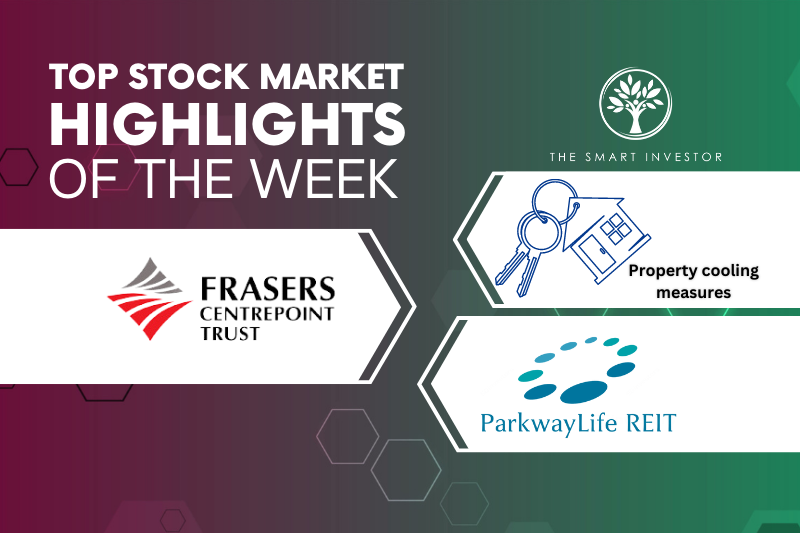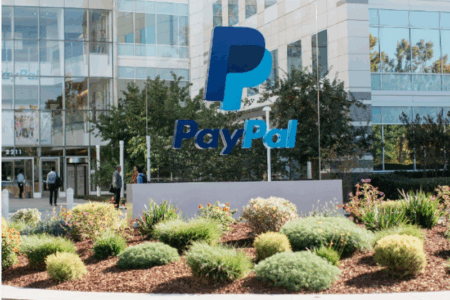Welcome to the latest edition of top stock market highlights.
Singapore property cooling measures
The government stunned the property market by unveiling a new set of cooling measures close to midnight on 26 April.
This constitutes the third round of cooling measures since December 2021.
The previous set of cooling measures was implemented in October 2022 and involved tweaking the loan-to-value limit for HDB loans and the assumed interest rate to compute the total debt servicing ratio (TDSR).
For this round, the target was the additional buyer’s stamp duty (ABSD).
Singaporeans buying their second property now have to pay an ABSD of 20%, up from 17% before the measures kicked in.
For the third property, the ABSD will now be 30%, up five percentage points from 25%.
For permanent residents, they will have to pay an ABSD of 30% for their second property and 35% for their third, up from the current 25% and 30%, respectively.
The sharpest jump was for foreigners, with them having to cough up an ABSD of 60% for the purchase of any residential property, double the 30% before the new measures took effect.
National Development Minister Desmond Lee explained that this latest round of surprise cooling measures was a pre-emptive move to cool investment demand.
Significant amounts of cash are flowing in from overseas into Singapore real estate as foreigners remain interested in investing in Singapore property as a stable and attractive asset class.
The hike in ABSD is to dampen demand and curb speculation so that genuine owner-occupiers will find prices affordable.
In addition to these measures, the government plans to launch up to 23,000 public housing flats this year and is prepared to launch up to 100,000 new flats in total between 2021 and 2025.
As such, there will be a rush of new housing supply coming onstream in the next few years to balance out the sustained demand for housing.
Analysts, however, feel that the ABSD increases may not dampen property prices much as they only affect a small proportion of buyers of investment property.
Still, the higher rates could reduce buying interest in the short term and impact real estate giants such as CapitaLand Investment Limited (SGX: 9CI), City Developments Limited (SGX: C09) and UOL Group Limited (SGX: U14).
Real estate brokerages APAC Realty (SGX: CLN) and PropNex Limited (SGX: OYY) may also be negatively impacted.
Frasers Centrepoint Trust (SGX: J69U)
Frasers Centrepoint Trust, or FCT, released its fiscal 2023’s first half (1H FY2023) earnings this week.
Gross revenue rose 6.5% year on year to S$187.6 million while net property income (NPI) improved by 5.7% year on year to S$138 million.
The better numbers came about because of improved retail sentiment and an increase in consumer spending, helping FCT to report higher foot traffic and tenant sales.
For 1H FY2023, shopper traffic jumped 35.3% year on year and tenant sales increased by 9.2% year on year.
Distribution per unit (DPU), however, slipped slightly by 0.1% year on year to S$0.0613 as S$3 million was retained for 1H FY2023.
Despite the flat DPU, prospects look good for the retail REIT as portfolio rental reversion clocked in at 4.3%, slightly higher than FY2022’s reversion of 4.2%.
FCT’s aggregate leverage stood at 39.6% as of 31 March 2023, up from 33.9% three months ago as the REIT acquired a stake in NEX mall in Serangoon, Singapore.
Going forward, the acquisition of NEX and the additional 10% stake in Waterway Point should contribute positively to revenue and NPI.
The manager is also looking at further acquisitions and asset enhancement initiatives (AEI) to drive growth.
Tampines 1 AEI is progressing smoothly and is slated for completion in the third quarter of next year.
Parkway Life REIT (SGX: C2PU)
Meanwhile, Parkway Life REIT also released its 2023’s first quarter (1Q 2023) business update.
Revenue jumped 21.7% year on year to S$37.3 million while NPI rose 23.5% year on year to S$35.3 million.
DPU for the quarter inched up 2.5% year on year to S$0.0365.
The healthcare REIT’s gearing stood at 37.5% as of 31 March 2023, with no debt refinancing needed till February 2024.
The REIT also enjoys a very low cost of debt of just 1.19% while the interest cover ratio stood high at 15.6 times.
The good news is that 78% of its interest rate exposure is hedged, thus mitigating a sharp rise in finance costs that may eat into the distributable income.
Elsewhere, renewal capital expenditure of S$150 million will help to enhance the attractiveness of Mount Elizabeth Hospital.
The organic growth in rent through a clear-communicated rent increase structure should also help the REIT’s DPU to increase steadily.
Did you know there are 5 REIT sectors with a high potential for creating passive income? If you are building retirement wealth, this is crucial information. We have a new report that details all you need to know about them. Find out which sector to pay attention to, and see if you can fit them into your portfolio. Click HERE to download the guide here for free.
Follow us on Facebook and Telegram for the latest investing news and analyses!
Disclosure: Royston Yang does not own shares in any of the companies mentioned.





